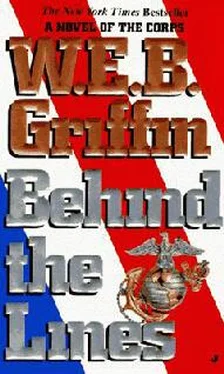W.E.B. Griffin - The Corps VII - Behind the Lines
Здесь есть возможность читать онлайн «W.E.B. Griffin - The Corps VII - Behind the Lines» весь текст электронной книги совершенно бесплатно (целиком полную версию без сокращений). В некоторых случаях можно слушать аудио, скачать через торрент в формате fb2 и присутствует краткое содержание. Жанр: prose_military, на английском языке. Описание произведения, (предисловие) а так же отзывы посетителей доступны на портале библиотеки ЛибКат.
- Название:The Corps VII - Behind the Lines
- Автор:
- Жанр:
- Год:неизвестен
- ISBN:нет данных
- Рейтинг книги:3 / 5. Голосов: 1
-
Избранное:Добавить в избранное
- Отзывы:
-
Ваша оценка:
- 60
- 1
- 2
- 3
- 4
- 5
The Corps VII - Behind the Lines: краткое содержание, описание и аннотация
Предлагаем к чтению аннотацию, описание, краткое содержание или предисловие (зависит от того, что написал сам автор книги «The Corps VII - Behind the Lines»). Если вы не нашли необходимую информацию о книге — напишите в комментариях, мы постараемся отыскать её.
The Corps VII - Behind the Lines — читать онлайн бесплатно полную книгу (весь текст) целиком
Ниже представлен текст книги, разбитый по страницам. Система сохранения места последней прочитанной страницы, позволяет с удобством читать онлайн бесплатно книгу «The Corps VII - Behind the Lines», без необходимости каждый раз заново искать на чём Вы остановились. Поставьте закладку, и сможете в любой момент перейти на страницу, на которой закончили чтение.
Интервал:
Закладка:
"Sir, with respect, I would prefer to go back to sea."
"So would I, Mr. Lewis," Admiral Wagam said. "But unfortunately the Navy feels I am of more use behind a desk, and I have decided you will be of more use working for me. They're going to discharge you tomorrow. Move into quarters, take seventy-two hours, and then report to me at CINCPAC."
"Admiral, I don't know if you know why I'm in here."
"Officially, you slipped in the shower. Leave it at that, Mr. Lewis. You are not the first officer who had far too much to drink than was wise."
Despite the terrible temptation, Lewis did not so much as sniff a cork on his seventy-hour liberty. Afterward, he reported to Admiral Wagam at CINC-PAC as ordered.
Six weeks later, it was officially determined that the Remora, two weeks overdue for refueling at Midway, was missing and presumed lost with all hands at sea.
The next day, Chambers D. Lewis was promoted lieutenant.
It therefore followed, in Lewis's mind, that if he were not a coward, he would not have gotten stinking, fall-down drunk in the Waikiki Beach Hotel, he would not have cracked his head, he would have gone on another patrol aboard Remora, and he would now be dead.
He went to Admiral Wagam and asked to be returned to submarine service. The Admiral made it rather clear he thought the request was expected, and rather childish, and denied it.
"And please, Chambers, do not make a habit of making such requests again and again in the belief you can eventually wear me down. If I get tired of hearing them, you'll wind up at Great Lakes training boots, not going back to the submarines. I need you here; you're good at what you do. You are, whether you think so or not, doing something useful to the Navy."
But it was different, of course, when Operation Windmill came up. Op-eration Windmill was important to the Navy, because it was important to CINCPAC. Because of his experience, he would be more useful to the Navy aboard the Sunfish representing Admiral Wagam (and thus CINCPAC) than he would be carrying Wagam's briefcase and answering his telephone.
If he had not volunteered to go aboard the Sunfish, he could not have looked at himself in the mirror.
[THREE]
After giving the matter a good deal of thought, Captain Robert B. Macklin, USMC, finally decided that going to the OSS Brisbane Station chief was the wise thing to do, even if the Station Chief was not happy to learn of the prob-lem.
That was to be expected, Macklin concluded. The Station Chief-he did not know his name, and it was not offered-was certainly going to be upset to learn of the death of Major Brownlee, both as a human matter and because Brownlee's loss would adversely affect the mission.
It was also understandable that the Station Chief was upset to learn that Macklin himself was not qualified by training or experience to step into Brownlee's shoes-not to mention his physical condition. And on top of that, it was necessary to inform him of the situation vis-a-vis himself and Stecker, Sessions, and McCoy.
If he were the Station Chief, Macklin decided, he would have been as upset as the Station Chief was; and in the circumstances, he would have done what the Station Chief almost certainly did, seek guidance from superior head-quarters. In this case, that of course meant going directly to OSS Headquarters in Washington for direction.
The station must certainly have some sort of high-speed communication link with Washington, Macklin theorized, perhaps even a shortwave radio sys-tem with no other purpose. It should be possible, in extraordinary circum-stances like these, to get an answer from Washington in twenty-four hours, perhaps in even less time.
Thus, when the knock came at his door, it was perfectly reasonable to as-sume that it was either a summons to the telephone at the end of the corridor, or that it would be someone from the OSS, perhaps the Station Chief himself.
He opened the door and found himself looking at a tall, good-looking Naval officer wearing submariner's dolphins on the breast of his khaki shirt and the twin silver bars of a full lieutenant on his collar points.
"Hello, Bob," Lieutenant Chambers D. Lewis, USN, said, putting out his hand. "Long time no see."
It took a moment for Macklin to make the connection, to remember the Lieutenant as a midshipman at the Academy, to remember that they had served together on a Court of Honor matter that had seen three midshipmen dismissed in disgrace.
"Lewis, isn't it?" Macklin asked. "Lewis, Chambers D.? '40?"
"Right," Lewis said. "May I come in?"
"Of course," Macklin said, and pulled the door fully open.
I knew there would be an immediate response.
"I'll be damned," Macklin said, offering his hand. "I expected someone, but the last person in the world I expected was you."
"I'm a little surprised to be here myself," Lewis said.
He dipped his hand in Sessions's musette bag and came out with a pair of swimming trunks.
"These are for you," he said. "From Ed Sessions."
Macklin looked at them suspiciously.
"No jockstrap," Lewis said.
"What are they for?"
"We're about to practice loading things into rubber boats," Lewis said. "Sessions is waiting downstairs."
My God, maybe he's not from the OSS!
"Lewis, exactly what are you doing here?"
"More or less the same thing you are," Lewis said.
"I'm here on a classified mission," Macklin said. "For the OSS."
"Operation Windmill," Lewis said. "So am I."
"Then you are in the OSS?"
"No. Actually, I'm from CINCPAC."
"I don't understand," Macklin said. "What's your connection with Oper-ation Windmill? Who told you about it? It's highly classified."
"Admiral Wagam," Lewis said. "Of CINCPAC. I'm his aide. I'm being sent along to see if I can make myself useful."
He's not OSS. He just made that perfectly clear.
"How do you mean 'useful'?"
"To make sure the submarine goes where it's supposed to go, and stays there as long as necessary."
"There may not be a submarine," Macklin said.
"Oh, there'll be a submarine, all right," Lewis said, chuckling. "You can bet on that."
"Things have happened," Macklin said. "I'm not at all sure how much of any of this I'm in a position to tell you. But I can tell you this much: This mission may be scrubbed. Should be scrubbed."
"What sort of things have happened?"
"I really don't know if I should be talking about this to you," Macklin said.
"You're worried, am I cleared for this? The answer is yes. If you have a question about that, check with Captain Sessions."
"He's one of them."
"One of who?"
"I'm not qualified to lead this mission, you know," Macklin said. "The man who was supposed to lead it, who was qualified to lead it, crashed at sea."
"Major Brownlee. I heard about that. Sorry."
"He was a good man, a fine officer. I was his deputy."
"Well, unless they send somebody to replace him, it looks like you will have to take his place."
"Not only am I not qualified to lead this mission, but I haven't fully recov-ered from my wounds. I've reported this to the proper authority, and they said they'd be in touch. That's who I thought you were. My replacement."
"No," Lewis said. "A reinforcement, maybe, but not a replacement."
"It's not, you understand, that I'm trying to get out of anything; it's simply that I don't have the training to lead a mission like this."
"According to Sessions, one of Pickering's Marines, Lieutenant McCoy, is going to lead it."
"McCoy is a first lieutenant, and I'm a captain. The responsibility will be mine."
"I don't think so," Lewis said. "Not if competent authority-and General Pickering is certainly a competent authority-places someone else in com-mand."
Macklin looked at him with fresh interest.
Читать дальшеИнтервал:
Закладка:
Похожие книги на «The Corps VII - Behind the Lines»
Представляем Вашему вниманию похожие книги на «The Corps VII - Behind the Lines» списком для выбора. Мы отобрали схожую по названию и смыслу литературу в надежде предоставить читателям больше вариантов отыскать новые, интересные, ещё непрочитанные произведения.
Обсуждение, отзывы о книге «The Corps VII - Behind the Lines» и просто собственные мнения читателей. Оставьте ваши комментарии, напишите, что Вы думаете о произведении, его смысле или главных героях. Укажите что конкретно понравилось, а что нет, и почему Вы так считаете.










